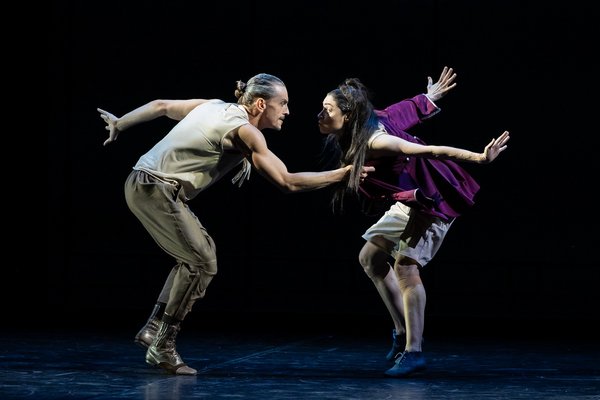
THE PYGMALION EFFECT
1 June 2024, 11 a.m.
In Brief
Ballet in two acts
In Greek mythology, the unmarried king and sculptor, Pygmalion falls in love with his own work, as his sculpture of a woman turns out to be so perfect and life-like. “This ballet is a choreographed interpretation of the myth of artist and his work, shedding light on how much art and life are interconnected yet distinct from each other. The ballet focuses on a girl living in deprivation, who finds richness and performance perfection in dance, where the elusive lightness of beauty and movement can only be achieved through hard work, while the seemingly attractive life on stage does not save one from being lonely. With the guidance of the famous dancer, the heroine steps onto a path on which changing her body seems to be an entertaining experiment in the beginning, but turns into real drama in the end”, says choreographer Boris Eifman. The tragicomic ballet set for Johann Strauss Jr.’s virtuoso music is first presented by the Hungarian National Ballet in 2023.
Details
- Location
- Hungarian State Opera
- Date
- June 1, 2024
- Start time
- 11 a.m.
- End time
- 1:30 p.m.
Synopsis
Act 1
Gala, the dweller of city outskirts, calls on tourists to enjoy the ride in a carriage driven by
her father, Holmes.
The life of Leon, a superstar of ballroom dancing, is so much more glamorous. He welcomes
the arrival of a new day in his luxurious home surrounded by maids under supervision
of stern Greta.
Gala is full of admiration as she watches the ballroom dancing tournament. Leon and his
partner Tea are the favourites but, sadly, a mistake costs them the victory.
Gala rescues Leon from mobsters and makes it into the house of the public’s darling. Holmes,
who is trying to blackmail the celebrity, also manages to get inside. Gala rushes away.
Nonetheless, her introduction to the unfamiliar and alluring world leaves its mark: a dream
to become a dancer and affection for Leon are kindled within the young woman.
In the grim suburbs Holmes and his drinking mates are having a wild party. Exhausted, the
group goes quiet. In his dream Holmes is visited by a messenger of the Heaven, who bans
his favourite pursuits – women and drink.
Gala’s appearance in the dance class causes general confusion. Leon makes a bet with the
Coach – he will transform this gawky girl into a star.
Act 2
Gala is subjected to a gruelling exercise routine. This is not how she envisaged her training.
Her body, used to unrefined movement, resists unfamiliar plastic of dance. At a convenient
moment the maids kick the hateful “savage” out of Leon’s house.
Holmes alternates between going rogue and preaching sobriety and chastity.
Leon locates dispirited Gala and tempts her with the images of her future triumph. Torturous
practice starts again. But Leon’s handling methods are not working. The only solution is
to resort to modern technology, which turns Gala into a mechanical dancing doll.
Tea steals the partner from one of the competing female dancers. Leon brings Gala into the
dance class. Everyone is struck by her transformation, and congratulations go to the tutor
whilst the pupil is ignored. The girl is filled with fury.
The support of the Coach helps Gala to recognize her own talent.
Gala and Leon make up and win the tournament. But separation is inevitable. Leon cannot
forget his partner’s past. Slum dwellers pay tribute to their queen. But Gala can only think
about Leon, with whom she is destined to be joined together only in her reverie...
Gallery
Reviews
"The style so typical of Boris Eifman carries social criticism, highlights commonplaces, depicts states of mind, and makes emotions visible. The most surprising thing is the language of movement, which is mainly built from contemporary dance, mixes with classical elements from time to time. All this, with the succession of fast movements, really challenges the dancers, who, instead of pointe shoes, wear high-heeled dancing shoes."
Ira Werbowsky, Der neue Merker
